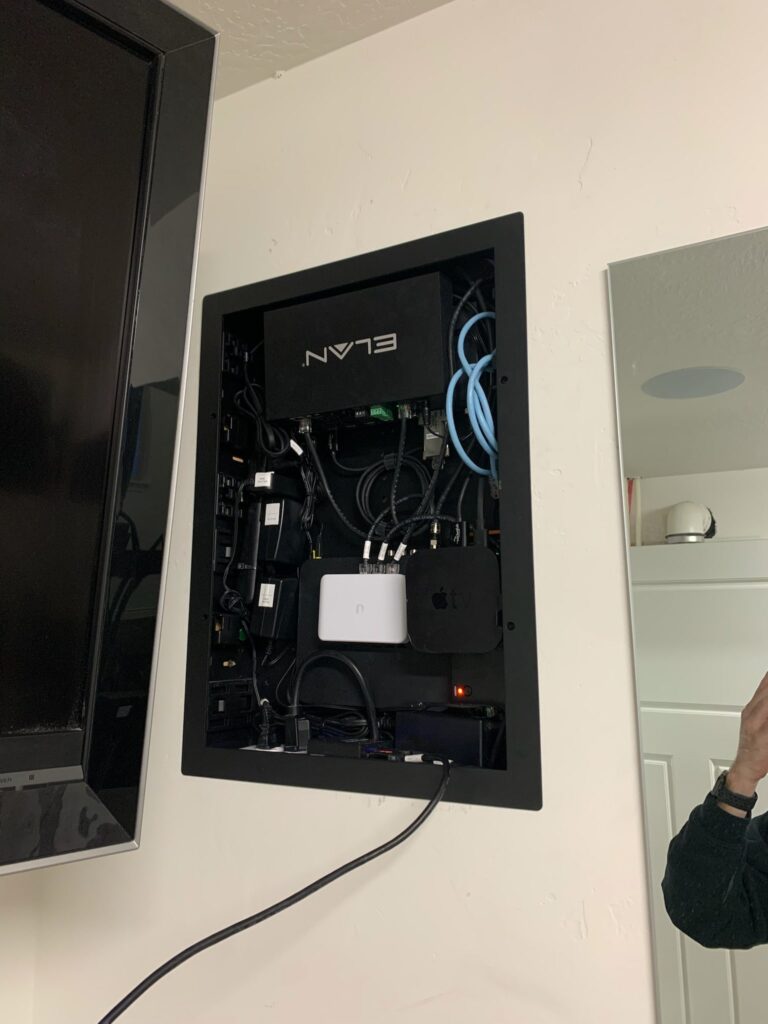With wireless technology improving every day, many assume it’s the best choice for home automation. However, there are several reasons why wired smart home automation remains the go-to solution for many homeowners. Wired connections offer dependable network stability, heightened security, and form the structured backbone for a truly connected smart home.
In this article, we’ll dive into the benefits of wired home automation and explore why it might be the perfect choice for your home.
Every house requires a solid technological control panel and foundation.
Every home needs a solid foundation for its technology—your control panel for the future. Consider how interconnected your home’s systems are: security cameras, lighting, climate control, and appliances all rely on seamless integration. Even your Wi-Fi setup needs wiring to ensure it works correctly. Given this reliance, it’s easy to see why a wired home automation system delivers unmatched reliability and consistency.
Wireless signals can easily be disrupted by walls, interference from other devices, or even weather conditions. This can lead to slow download speeds, buffering during video streaming, and inconsistencies across all Wi-Fi-dependent devices.
A wired system avoids these obstacles, using physical cables to transmit data. This ensures a strong, reliable connection that’s less prone to interruptions, providing a steady and secure network foundation for your entire home.
Wireless bandwidth overload creates a need for cabled connections.
The average American home now has 25 WiFi-connected devices, a number that is steadily rising with the rise in smart home technologies. From smartphones and laptops to smart thermostats and voice-activated assistants, our homes are becoming increasingly connected.
As more and more devices connect to your wireless network, you might start noticing a decrease in performance. This slowdown occurs because each device is competing for bandwidth on the same frequency. The more devices that are connected and actively using the network, the more congestion you’ll experience. This can lead to slower internet speeds, buffering during streaming, and a less responsive smart home environment.
You can solve this problem by hardwiring some of your devices to create a dedicated network for them. This is especially important for devices that require a lot of bandwidth, such as streaming video or gaming consoles. Wiring allows you to create a fast and reliable connection that won’t be bogged down by other devices on your network.
This is especially crucial for people who use the internet connection on a daily basis for work. With multiple devices for various purposes, it can be challenging to manage them all on a single wireless network. Not to mention, purchasing additional Wi-Fi extenders or upgrading your home’s internet connection to a better Wi-Fi plan is costly.
Wireless vs wired home automation and the difference between building a better signal.
Building a pathway for signals to travel is a foolproof method to avoid signal issues. Wireless signals need a clear line of sight to work correctly and often have difficulty penetrating walls. If you live in a multi-story home, the distance the signal must travel also affects its strength.
On the other hand, wired home automation uses Ethernet cables that can be run through the walls, making it easier to connect devices in different rooms or on different floors. An ethernet cable also provides a more consistent and secure connection instead of relying on a wireless signal that is susceptible to interruptions.
With a better signal, you’re able to:
- Download and upload files faster. No more waiting for files to buffer or download at a snail’s pace.
- Get higher-quality streaming video (4K video included) and audio. Wireless signals can cause lagging and choppy video or audio playback. Hardwired connections provide a much smoother streaming experience.
- Eliminate dead spots in your home. Wireless signals don’t always reach every corner of your home, but with Ethernet cables, you can connect devices in any room.
Ultimately, you can enjoy better overall performance with the help of a wired home automation system.
Secure your space and keep your peace of mind.
One of the main concerns with any type of home automation is security. You want to ensure that your family and belongings are safe when away from home. Wireless systems are more vulnerable to hacking because they rely on radio frequencies that struggle with interceptions.
On the other hand, wired home automation uses physical cables that are much more difficult to tamper with. This provides an extra layer of security and peace of mind, knowing that your home is better protected against intruders.
In addition to the physical safety of your home, wired network systems also protect your privacy. Wireless signals can be intercepted by anyone within range, allowing them to access your personal information. With a wired connection, your data is better protected against eavesdropping and hacking.
If you’re looking for a more secure and private home automation system, look no further than a wired solution.
Future proof your house with cabling.
As technology advances, the need for faster and more reliable connections will only increase. Wireless systems will become outdated quickly as new standards are introduced, but with a wired connection, you can easily upgrade your home automation system to the latest and greatest.
As technology evolves and new devices are introduced, the way we use our homes will change. In recent years, the jump to 5G and gigabit network speeds has been exponential. In addition, the need to support tech like 8K videos, VR, and other AI devices creates a demand for even faster data speeds. Thus, to keep up with these advances, it’s crucial to have a home automation system that can grow with you.
With a wired connection, you won’t worry about your system becoming outdated or incompatible with new devices. Instead, simply upgrade your cables and hardware as needed, and you’ll be good to go.
Cabling is also much easier to install while constructing a new home. However, retrofitting your home isn’t out of the question either. Either way, work with your contractor and AV and automation professionals to include the necessary design and wiring for a home automation system.
Read more: When to Include AV and Automation Professionals in New Home Construction Planning
Keep fiber optic in your technological diet.
Fiber optic is the premium standard for wired home automation. It uses light instead of electricity to send data, making it much faster than other types of cables. This is an excellent option for people who want the best possible performance from their home automation system.
Fiber optic is also much more durable than other types of cables. In addition, it’s not susceptible to interference from radio frequency, electromagnetic, or electrical signals and can withstand extreme temperatures, making it ideal for use in any home.
While fiber optic is more expensive than other cables, it’s a worthwhile investment if you’re looking for a top-of-the-line system. Not to mention, the price is only going to come down as the technology becomes more widely available.
Wireless vs wired home automation — upgrade your smart home in every way with wired home automation.
Is there even a debate on wireless vs wired home automation at this point? Not really! This is because wired systems offer advantages that even Wi-Fi can benefit from.
Let’s review all the benefits of wired home automation.
Home automation systems allow you to control various aspects of your home using a central controller or your smartphone. While many home automation systems are wireless, some homeowners prefer wired systems for various reasons.
Low-Security Risk
One of the key advantages of wired home automation is that it poses a lower security risk compared to wireless systems. This increased security is primarily because wired systems are more challenging for hackers to access remotely. Without the wireless entry point, it becomes significantly harder for unauthorized individuals to interfere with or control the system. Because of the physical connection required for wired systems, wired home automation systems provide better security.
Interference-Free
Wired home automation systems are also less likely to experience interference from outside signals. This increased reliability means that you can count on them to work consistently when you need them. Since they are not susceptible to the same kind of signal disruptions that can affect wireless systems, you can trust that your home automation setup will perform its tasks smoothly and without unexpected interruptions.
Stability and Reliability
Wired home automation systems are also more stable and reliable than wireless systems. This is because wired systems are wired directly into your home’s electrical system, meaning they are a permanent part of your home’s infrastructure. This can be an advantage if you plan on staying in your home for a long time.
Fast Service and Support
If you have a wired home automation system, you can usually receive faster service and support from your home automation provider. This is because wired systems are more accessible for home automation providers to troubleshoot and fix.
Now, while we’re big advocates for wiring, we wouldn’t be doing our job if we didn’t mention a few of the disadvantages of wired home automation.
Disadvantages of Wired Home Automation Systems
While wired home automation systems offer several advantages, they also have disadvantages.
More Involved Installation
One of the biggest disadvantages of wired home automation is that it can be more complicated to install than wireless systems. This is because wired systems need to be wired into your home’s electrical system, which can be complex and time-consuming.
Higher Initial Cost
Wired home automation systems also tend to be more expensive than wireless systems. This is because wired systems require more equipment and labor to install.
Equipment Longevity
While wired home automation systems are more stable and reliable than wireless systems, wired equipment has a shorter lifespan. This is because wired equipment is constantly exposed to electrical currents, which can cause wear and tear over time.
Cable Management
Wired home automation systems also require more careful cable management than wireless systems. This is because wired systems have many cables that need to be routed through your home in a tidy and organized manner.
Overall, wired automation systems are best for homeowners looking for a reliable and secure system. Additionally, it is a good choice for homeowners who do not mind the higher initial cost and are not concerned about the flexibility of their system.
Connect your home appliances, smart home devices, and more with a wired home automation system!
Whether you want automated shades, smart thermostats, a home theater system, or lighting control, our team can design and install a custom wired home automation solution!
Our team specializes in creating and collaborating with interior designers and AV installation technicians to create custom home automation systems that are both aesthetically pleasing and functional.
If you’re interested in learning more about the benefits of wired smart home automation, or if you want to discuss the possibility of installing a system in your home, contact us today! We would be happy to answer any questions you have. In the meantime, check out our budget calculator to start planning!



